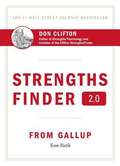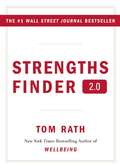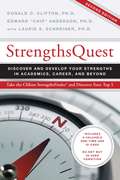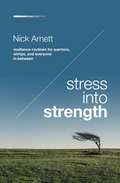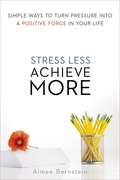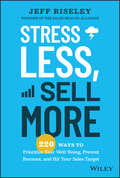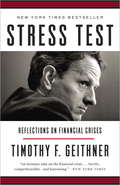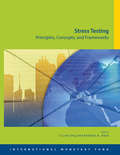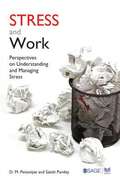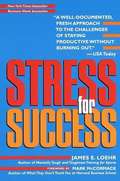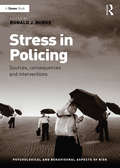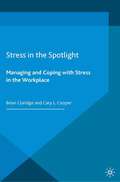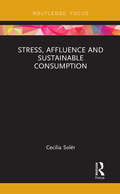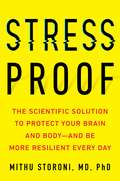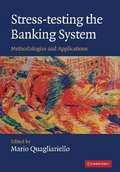- Table View
- List View
StrengthsFinder 2.0
by Tom RathThis book helps readers discover their distinct talents and strengths and how they can be translated into personal and career successes.
StrengthsFinder 2.0
by Tom Rath<p>Chances are, you don't. All too often, our natural talents go untapped. From the cradle to the cubicle, we devote more time to fixing our shortcomings than to developing our strengths. <p>To help people uncover their talents, Gallup introduced the first version of its online assessment, StrengthsFinder, in the 2001 management book Now, Discover Your Strengths. The book spent more than five years on the bestseller lists and ignited a global conversation, while StrengthsFinder helped millions to discover their top five talents. <p>In its latest national bestseller, <i>StrengthsFinder 2.0</i>, Gallup unveils the new and improved version of its popular assessment, language of 34 themes, and much more (see below for details). While you can read this book in one sitting, you'll use it as a reference for decades. <p>Loaded with hundreds of strategies for applying your strengths, this new book and accompanying website will change the way you look at yourself -- and the world around you -- forever.</p>
Strengthsquest: Discover and Develop Your Strengths in Academics, Career, and Beyond
by Donald O. Clifton Laurie A. Schreiner Edward AndersonThis book and the strengths approach to achieving in academics, career, and beyond represent a revolutionary departure from traditional and counterproductive philosophies and practices. We hope that its principles resonate with you, and that you apply the strengths approach to achieving success in all of your life's endeavors!
Stress Into Strength: Resilience Routines for Warriors, Wimps, and Everyone in Between
by Nick ArnettTurn debilitating stress into remarkable strength through proven resilience routines taught by a critical incident instructor and first responder leader. Transform your personal and professional life with insights gained from some of the most stressful professions you can imagine.Discovering and practicing your ideal rhythm of stress and renewal – physical, social, and spiritual – will enhance your health, strength, and resilience. Stress reactions are automatic, but to transform stress into strength, you need to become intentional about routines that activate your natural renewal systems. The proven tips throughout Stress Into Strength will help you do exactly that.Nick Arnett has had distinguished, high-stress careers, including as a paramedic and firefighterwith experience in domestic and international disasters, as well as in the corporate world as a software founder and executive. For more than 15 years, he has led and taught people how to be resilient through crises large and small. In Stress Into Strength, Nick first shows how our stress reactions and equally natural renewal systems help us to seize opportunities, rise to challenges, and cope with threats.After reading this book and applying its principles, you will learn how to:Let go once and for all of the stress myths that the human brain&’s &“negative&” bias reinforces.Gain insight into your personality-based stress reactions and channel any negative, knee jerk reactions into positive, long-term responses to overcome your biggest obstacles.Learn how to choose physical, social, and spiritual stress and renewal responses that will help make your more flexible and resilient.Learn tips on when to seek help with trauma, staying undaunted through crisis in the workplace, and even raising resilient children.
Stress Less, Achieve More: Simple Ways to Turn Pressure into a Positive Force in Your Life
by Aimee BernsteinWith greater workplace demands comes greater stress--and it's taking a toll on our productivity and well-being. The standard recommendations are to exercise, meditate, eat better. But who has time for yoga poses amid nonstop meetings and pressing deadlines? Stress reduction becomes one more thing to do! Executive coach and psychotherapist Aimee Bernstein offers a more effective and realistic approach: embrace the pressure. See it as an energy source. Tap into its flow to accomplish more while feeling calm and centered. It's a counterintuitive message that frenzied professionals can actually use. Stress Less. Achieve More. delivers relief for the overwhelmed. Part training manual, part spiritual guide, the book uncovers a total mental/physical/emotional formula to: Stop reacting defensively * Retrain natural responses to stress triggers * Resolve conflicts harmoniously * Energize fatigued teammates * Relax in difficult situations In today's overbooked world, pressure is almost impossible to avoid. But with the tips, techniques, and exercises in Stress Less. Achieve More., you can turn it into your ally--and thrive under even the most demanding circumstances.
Stress Less, Sell More: 220 Ways to Prioritize Your Well-Being, Prevent Burnout, and Hit Your Sales Target
by Jeff RiseleyImprove your sales performance and avoid burnout with Mental Health, resilience, and stress-management strategies. In Stress Less, Sell More: 220 Strategies to Prevent Sales Burnout and Maximize Mental Performance, celebrated sales leader and founder of the Sales Health Alliance, Jeff Riseley, delivers a practical and impactful handbook that makes it easy for sales teams to perform better and build mental health conversations consistently into their busy selling days. In the book, you’ll explore ways to navigate the pressures and stressors faced by every sales professional. Its pages can be read day-by-day or all at once, and a companion website supplements the material found in the book with free articles, , and videos. You’ll also discover: How to build an individual Mental Health and stress-management toolkit to improve mental resilience and sales performance. Ways to overcome stressors in sales like lost deals, missed targets and buyers ghosting. Helpful team-based changes that dramatically improve salesperson mental health—like quota relief during vacationsAn essential guide to improving salesperson wellbeing and sales performance, Stress Less, Sell More will prove to be an invaluable resource for sales leaders, team leaders, salespeople, and sales teams looking for ways to make daily work life less stressful and more productive.
Stress Management In Law Enforcement
by Leonard Territo James D. SewellThe revised third edition of Stress Management in Law Enforcement by Dr. Leonard Territo and Dr. James Sewell is once again a carefully selected collection of the leading articles on stress and its consequences for police personnel. A brief summary precedes each section to assist the reader in readily identifying articles which might be of particular interest. Each article contains end-of-chapter discussion questions which are answered in detail in the instructor's manual. The sections are also accompanied by a glossary of terms and a list of additional recommended readings. This book will specifically interest the criminal justice academic community as an adjunctive resource in police management courses or as the primary text in upper division seminars on the topic of police stress management. This book will also be of considerable interest to police administrators and officers who must deal on a daily basis with the negative side effects of stress. Stress Management in Law Enforcement is relevant for police administrators as well as police psychologists, psychiatrists, counselors, social workers, and other mental health professionals who are called upon to provide guidance and assistance to police officers.
Stress Management Programme For Secondary School Students: A Practical Resource for Schools
by Sarah McNamaraThis is a resource pack for teachers to use in classrooms to help students combat stress. As well as the theory, it presents photocopiable worksheets. The pack covers the following areas: * preparing for exams* learning study skills* building self-confidence and self-esteem* coping with relationships and family problems* diet and exercise issues. The information is presented in an accessible way and there are plenty of follow-up activities and strategies for coping. Everything is geared towards making it readable and interesting for young people without losing sight of the needs of the curriculum.
Stress Management through Mind Engineering
by Rama Prosad BanerjeeExperiencing stress in our everyday life is only human. Be it altercations with peers, upcoming deadlines or unnerving life events which can’t be controlled. There’s good stress that motivates us, and there’s stress that’s unhealthy; it controls our thoughts and feelings, leading to insomnia, heart diseases and even mental health issues. So how do we stop sweating over small things and start living blissfully? Stress Management through Mind Engineering takes the readers through the process of mind engineering to help them create a stress free mind. A mind that can bear the force of the external environment by tapping the power within. Read this book to not only win over stress but also eliminate the risk of burnouts, understand the cause of high stress, reflect on one’s actions and behaviour and ultimately live a happier, healthier life.
Stress Test
by Timothy F. GeithnerStress Test is the story of Tim Geithner's education in financial crises. As president of the Federal Reserve Bank of New York and then as President Barack Obama's secretary of the Treasury, Timothy F. Geithner helped the United States navigate the worst financial crisis since the Great Depression, from boom to bust to rescue to recovery. In a candid, riveting, and historically illuminating memoir, he takes readers behind the scenes of the crisis, explaining the hard choices and politically unpalatable decisions he made to repair a broken financial system and prevent the collapse of the Main Street economy. This is the inside story of how a small group of policy makers--in a thick fog of uncertainty, with unimaginably high stakes--helped avoid a second depression but lost the American people doing it. Stress Test is also a valuable guide to how governments can better manage financial crises, because this one won't be the last. Stress Test reveals a side of Secretary Geithner the public has never seen, starting with his childhood as an American abroad. He recounts his early days as a young Treasury official helping to fight the international financial crises of the 1990s, then describes what he saw, what he did, and what he missed at the New York Fed before the Wall Street boom went bust. He takes readers inside the room as the crisis began, intensified, and burned out of control, discussing the most controversial episodes of his tenures at the New York Fed and the Treasury, including the rescue of Bear Stearns; the harrowing weekend when Lehman Brothers failed; the searing crucible of the AIG rescue as well as the furor over the firm's lavish bonuses; the battles inside the Obama administration over his widely criticized but ultimately successful plan to end the crisis; and the bracing fight for the most sweeping financial reforms in more than seventy years. Secretary Geithner also describes the aftershocks of the crisis, including the administration's efforts to address high unemployment, a series of brutal political battles over deficits and debt, and the drama over Europe's repeated flirtations with the economic abyss. Secretary Geithner is not a politician, but he has things to say about politics--the silliness, the nastiness, the toll it took on his family. But in the end, Stress Test is a hopeful story about public service. In this revealing memoir, Tim Geithner explains how America withstood the ultimate stress test of its political and financial systems.From the Hardcover edition.
Stress Testing Principles, Concepts, and Frameworks: Principles, Concepts And Frameworks
by International Monetary FundA report from the International Monetary Fund.
Stress Testing at the IMF
by Mark Swinburne Marina Moretti Stéphanie StolzA report from the International Monetary Fund.
Stress The Psychology of Managing Pressure
by DKCovering sources of stress in every area of life: work, exams, relationships, social pressure, money, and more, this practical guide combines infographics and self-analysis questionnaires to make information easy to access and apply.This dynamic infographic program, founded on cutting-edge psychological research, enables you to deconstruct and deal with stress head-on. Stress: The Psychology of Managing Pressure helps you identify external and internal sources of stress in your life and reframe unhelpful patterns of thought into powerful psychological solutions that you can apply every day. Underpinned by psychological theory, with relevant findings from psychologists, doctors, and teachers, this book will help you smash the shadow of stress in any area of your life and emerge happier, healthier, and more productive.
Stress and Work
by D M Pestonjee Satish PandeyStress and Work focuses on the problem of stress from various angles and perspectives and provides empirical findings relevant to different occupational settings. It provides comprehensive research literature, which has been divided along the following theoretical perspectives: Occupational Stress and Burnout; Work-Family Conflict and Stress; Positive Stress Management; and Stress and Spirituality. This volume will be a resource-book for researchers and practitioners of management, psychology, sociology, and behavioral sciences. The prospective reader of human society and human nature will find this volume to be of immense utility.
Stress and the Manager: Making It Work for You
by Karl AlbrechtOurs is a fast paced world. The need to help ourselves and other professional people manage stress has never been greater. This book pioneered the wave of business interest in stress management, based on Karl Albrecht's original work with stress management training. Use Stress and the Manager as your own personal guide to managing stress, and as a resource for your managers in training programs on personal effectiveness and stress management. It covers the basic definition of stress, how it effects the body, knowing when stress is harmful and when it is not, and how to manage your life, work, and activities to keep stress within your comfort zone. Also covers techniques for managing that can help others control their stress levels. Dr. Hans Selye, father of the medical theory of stress, says, ”I would not hesitate to support this book and will give it a place of prominence in the library of our International Institute of Stress, for all those concerned with management.” Provide a copy of Stress and the Manager to every one of your managers and team leaders.
Stress at Work: Management And Prevention
by Jeremy StranksWork-related stress and resulting sickness absence costs the UK economy about £3.7 billion every year (HSE research). In this jargon-free guide, Jeremy Stranks explains what stress is and what causes it, how people respond to stress and cope with it, how stress can be evaluated and managed and what employers’ legal responsibilities are.Written for managers, HR professionals and safety reps, the emphasis of this book is strongly on practical advice and solutions. The author provides simple tools to measure and assess stress and shows how to deal with a range of stress-creating workplace situations, such as bullying, harassment and violence at work. The book also details how to implement a stress management system that complies with the new HSE Management Standards to avoid civil claims and criminal sanctions by the enforcement agencies.End of chapter key points draw out the implications of the preceding text for the employer and an executive summary shows the main aspects that senior management have to be aware of. In addition, the book contains forms and templates to help with managing stress. These are also available for download on the companion website.Stress at Work will also be a valuable reference for students on the following courses as part of modules concerned with Human Factors: NEBOSH Certificate and Diploma courses, MSc courses in Occupational Health and Safety Management, IOSH Managing Safely, British Safety Council diploma and NVQ level 3 and 4 courses in Occupational Safety and Health.Jeremy Stranks has 40 years of experience in occupational safety and health enforcement, management, consultancy and training. He is a founding member of NEBOSH and has lectured on numerous training courses on all aspects of health and safety. His company Safety and Hygiene Consultants offers companies advice in drawing up Health and Safety policies, writing risk assessments and audit procedures.
Stress for Success
by James E. LoehrIn Stress for Success, business people get a practical, performance-based program to strengthen their physical, mental and emotional resilience. Loehr's 30-day program shows readers how to gradually make the kind of personal lifestyle changes that bring about the kind of high-level performance demanded of people at every level of the corporation.
Stress in Policing: Sources, consequences and interventions (Psychological and Behavioural Aspects of Risk)
by Ronald J. BurkeStress in policing remains a serious concern for individual officers, their families, their organizations and society at large. As an editor of the Psychological and Behavioural Aspects of Risk series, Ronald J. Burke brings together the latest research findings and intervention strategies, shown to be effective, by an international group of experts. The contributors comprise of a group of high profile researchers and writers who are experts in their respective fields. This edited collection addresses such issues as: The increased risk of international terrorism Racial profiling Police Culture Police integrity Police suicide Inadequate police training The work of police officers exposes them to sources of stress that increase several risks in terms of their psychological and physical health, their family relationships, physical injuries, emotional trauma, ambiguity about their roles in society. Shift work, and undercover work add additional burdens to officers and their families. Police work also places risks on the communities in which officers serve in terms of officers being inadequately trained to deal with mentally ill citizens.
Stress in the Spotlight: Managing and Coping with Stress in the Workplace
by B. Claridge C. CooperBased upon interviews with individuals in high pressure positions, from business leaders to a bomb disposal expert, this book provides practical insight about how to identify, tackle and overcome any kind of stress.
Stress und Burnout in Organisationen: Ein Praxisbuch für Führungskräfte, Personalentwickler und Berater
by Ulrich ScherrmannDieses Buch hilft Führungskräften, Organisationsberatern und Coaches, Stress und Burnout im Unternehmen zu erkennen und zu bekämpfen. Es setzt dabei nicht nur bei individuellen Faktoren an, sondern auch bei dem, was wirklich hilft: Es erklärt organisationale Faktoren von Burnout in einem verständlichen, systemischen Organisationsmodell. Neben Grundwissen zu Ursachen von Burnout werden Tipps für einen adäquaten Umgang gegeben, die u.a. ein neues Paradigma von Gesundheit in Betrieben und Organisationen und das Thema Prävention umfassen. Der Praxisteil des Buches vermittelt konkrete Methoden und Checklisten für Führungskräfte sowie für die ganze Organisation. Erfahrungsberichte aus der Beratungsarbeit runden dieses praxisorientierte Handbuch ab.
Stress, Affluence and Sustainable Consumption (Routledge Studies in Sustainability)
by Cecilia SolérWhy do affluent consumers almost automatically acquire new versions or variations of products already at their disposal? Even though most of us know that this novelty consumption poses a serious threat to an environmentally and socially sustainable future, we continue to do it. Why? Research shows that consumption of new automobiles, clothing, furniture, electronics, home furnishing, household apparel, mobile phones, etc., is motivated by a desire to feel more secure, less anxious and better mood-wise. Affluent consumers seem to engage in novelty consumption not to feel better but rather to avoid feeling bad. Stress, Affluence and Sustainable Consumption discusses sustainable consumption from a stress perspective, adding an embodied understanding to the sustainability-related consumption challenges that we face today. A stress perspective on affluent consumption differs from current understandings on consumption, as it fully acknowledges the consumer as having a body (including a mind) that reacts to the numerous product offerings and retail spaces, both physical and online. A stress perspective can explain how our bodies try to cope with an overload of perceptual input provided by advertising messages, product launches and even store structures. This book will be of great interest to students and researchers of consumer psychology, sustainable consumption studies, sustainable marketing and markets as well as sustainable development more generally.
Stress-Free Productivity: A Personalized Toolkit to Become Your Most Efficient and Creative Self
by Alice Boyes, Ph.DFrom the author of The Anxiety Toolkit, a guide to creating your own personalized productivity plan, using self-science to make systems that work for you.There is no such thing as a one-size-fits-all productivity plan. The tricks that work for your colleague may not work as well for you. Or perhaps they don&’t work at all. The fact is that everyone has their own productivity quirks to make them work efficiently and effectively. They just don&’t know how to crack them. Enter former clinical psychologist Alice Boyes. In this innovative guide, she will help you diagnose your unique productivity profile and give you the framework to formulate a powerhouse personalized system. Drawing on groundbreaking research, countless examples, and quizzes in every chapter, this book will help you be the most growth-oriented, most effective and efficient, and most creative and visionary version of yourself. If you&’ve ever felt that you&’re too much of a perfectionist to be productive, or if the prepackaged advice from experts just doesn&’t work, this is the book for you. It will help you achieve more success and have the freedom to spend more of your time and energy on what&’s most meaningful to you.
Stress-Proof: The Scientific Solution to Protect Your Brain and Body--and Be More Resilient Every Day
by Mithu StoroniDiscover simple, science-based strategies for beating stress at its own game When’s the best time to exercise – and how much is too much? Which foods fortify the brain, and which do the opposite? How can we use music, movement, and motivation to boost our rational brain and keep our cool no matter what life throws our way? Short bursts of stress are an inevitable part of modern life. But how much is too much? Research is uncovering the delicate balance that can turn a brief stressful episode into systemic overload, eventually leading to inflammation, anxiety, depression, and other chronic health issues.This practical and groundbreaking guide reveals seven paths to fighting the effects of stress--to strengthen our natural defenses so that our minds remain sharp, and our bodies resilient, no matter what life throws at us.Each chapter examines a common stress agent—including inflammation, an out-of-sync body clock, cortisol levels, and emotional triggers—and presents simple ways to minimize its harmful effects with changes in diet, exercise, and other daily habits—including surprising hacks involving music, eye movements, body temperature, and more. Translating cutting-edge scientific findings into clear and simple advice, Stress-Proof is the ultimate user’s guide for body, mind and well-being.
Stress-testing the Banking System: Methodologies and Applications
by Mario QuagliarielloStress tests are used in risk management by banks in order to determine how certain crisis scenarios would affect the value of their portfolios, and by public authorities for financial stability purposes. Until the first half of 2007, interest in stress-testing was largely restricted to practitioners. Since then, the global financial system has been hit by deep turbulences, including the fallout from sub-prime mortgage lending. Many observers have pointed out that the severity of the crisis has been largely due to its unexpected nature and have claimed that a more extensive use of stress-testing methodologies would have helped to alleviate the repercussions of the crisis. This book analyses the theoretical underpinnings, as well as the practical aspects, of applying such methodologies. Building on the experience gained by the economists of many national and international financial authorities, it provides an updated toolkit for both practitioners and academics.
Stressaholic
by Heidi HannaA guidebook for the journey from exhaustion to enlightenmentChronic multitasking and ever-increasing demands on our time and energy have caused a neurochemically-based dependence on sources of stress and stimulation to provide fuel for our chaotic lifestyles. While this may boost performance in the short-term, studies have consistently shown that when stress hormones are elevated over time they create the worst form of internal wear and tear; decreasing productivity, wasting time, and even killing brain cells. As a result, modern society is tired and wired, suffering from physical exhaustion while mentally amped up, and unable to get adequate rest.Stress in and of itself is not bad, and is actually utilized for growth when balanced with adequate recovery. The solution to stress addiction is to build in and prioritize optimal rest and relaxation on a holistic level--body, mind, and spirit--in order to consistently recharge and create a more resilient operating system.Stressaholic shows you how to win the war on stress without limiting progress by creating an optimal performance pulse of stress and recovery for life.Explains the impact of chronic stress on the human operating system; body, mind, and spiritShows how a simple shift in mindset can dramatically alter physiological responses to stressReveals simple techniques for altering daily stress patterns to improve natural rhythms, creating a personalized performance pulseWith easy to implement tips and real-world examples of people and organizations that have turned stress into sustainable drive, Stressaholic will guide you on your journey from exhaustion to enlightenment!
